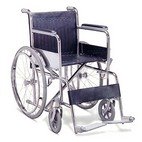Planned Obsolescence
and Disposable Products in Today’s ‘Feel Good’ “Green” Society
“Cheap”
versus “Inexpensive”
This post is somewhat off-topic however my ongoing problems
with my Permobil M300 power wheelchair had me thinking about quality or perhaps
today, the lack of quality in the products we purchase and use daily.
I was delighted to find that Motion Specialties, my current
wheelchair repair company had hired a repairman from the now defunct Shoppers
Home Healthcare. My experience with
Shoppers was a total nightmare, however their one and only bright spot was that
they had an excellent field service technician.
One of my many troubles with Shoppers was the difficulty in getting Shoppers
to dispatch any Field Service Technician to repair my wheelchair. I know he will be a great asset to Motion
Specialties.
When this technician arrived at my door, we began to discuss
the lack of quality of my wheelchair and in a wider scope, the lack of quality
in many of the products and commodities sold to the consumer in today’s
marketplace.
I was disappointed to learn that the wheelchair motors are
not refurbished and the electronic modules are not repaired but that they are
thrown into a bin and either disposed of, or they are crudely recycled for
metals and such. It seems like such a
waste of resources and energy.
As I mentioned in a previous post, an electronic module
controlling my wheelchair or that found in any television, may have stopped
working because of a defective resistor or capacitor. In bulk it may cost the manufacturer
one-thousandth of a penny to purchase, yet when damage, it is not repaired but replaced
with a new module is sold to you usually at hundreds of dollars.
It is no longer financially prudent to hire an electronics
technician to diagnose and repair these items.
It is cheaper to trash the item and sell the client an entirely new
unit. If not recycled properly, the rare
heavy metals often used in these components may be lost.
I asked, “Why aren’t wheelchairs made from military or
medical grade components?” It is not
cost effective for the wheelchair company.
It seems the manufacturer need the chair’s components to break down so
they can sell you replacement parts. The
bottom line is that it is more profitable.
The technician went on to explain that when a new wheelchair
is developed, their financial “bean counters” scrutinize the chair from top to
bottom asking “how much did this screw cost?”
“Can we replace it with something cheaper?” And so it goes…
And make no mistake: “Cheaper” does not mean “Less Expensive”. Cost reduction translates into an extra bonus
for the CEO and increased profits for the company shareholders.
I think about the household products I have bought, used and
had to replace after only a year or two.
I am on my third Cuisinart coffee maker. Suddenly one day, it just stops working with
no obvious reason. So I purchase another
(still a good make according to reviews) and cross my fingers. I could purchase another brand but in this
world it is just a game of ‘musical appliances’. They are all made to fail after a certain
period of time. If I decide to try another
brand, someone who has that broken ‘other brand ‘now tries mine old brand. And so it goes; by continuously having to
buy replacement appliances, you are keeping the appliance maker in
business. If your toast lasted thirty
years, toaster sales would grind to a halt.
Plastic is a fine product but it is used in the wrong places
perhaps ninety percent of the time. My
toaster's plastic sides are warped and discoloured. I have
encountered worn plastic gears and broken plastic hinges. But plastic is inexpensive to the
manufacturer and cheap so it will break requiring the purchase of a
replacement.
My RCA television has failed for the second time. First time it was a module which cost over
$150 to replace. Now the module is no
longer available as my TV is considered old technology.
I have an issue with the cordless tools currently on the
market. It is wonderful not to be
tethered to a wall with an electrical cord.
But anyone who buys a cordless tool must realize that the batteries do
not last forever. After a period of
time, they will no longer hold a charge and will have to be replaced. The problem is that (a) you find the
replacement battery costs more than the appliance which requires it, or (b) the
battery is no longer made for that particular model of appliance or tool.

My wife has a Shark brand floor sweeper and the replacement
battery cost more than a new Shark sweeper.
A Sears department store salesman gave me his sales pitch stating that “This
cordless drill is the last one you will ever need…it will last a lifetime!”
Well, yes… it just might, but I found out
that they no longer manufacture the rechargeable battery after 15 years.
I found the model in the U.S. and purchased
it, but even though it is for the same model, the U.S. battery has different
internal wiring.
Different standards for
different countries – it won’t work.
So
now it is a useless piece of junk which I have to dispose of.
One manufacturer is currently advertising some 50 tools that can be powered by one
battery. All I see are fifty useless
tools when the company suspends manufacture of the battery model. And you know they eventually will.
The bottom line is this: If you have rechargeable batteries, they will eventually fail and have to be replaced. Will the manufacturer still be making the battery?....and will the replacement be reasonably priced?
So, do you bring your watch in to be repaired?
Do you take your shoes to a cobbler to be re-soled?
No, it doesn’t make sense to pay for the high
cost of repairs (if even available) unless you have designer shoes or a Rolex
watch.
Like the rest of us, you throw
them out and buy another.
Society prides itself on extolling the virtues of going
green. Governments may mandate it. A green disposal fee may be added to the cost
at time of purchase and the local dump (sorry, environmental refuse and
recycling center) may charge again for a disposal fee.
We all get a fuzzy warm feeling all over because we are “green”, however, I wonder how many batteries,
appliances, shoes, watches, batteries, televisions, plastic bags and bottles,
cell phones, and on and on –get thrown away and not properly recycled.
In past years I’ve read stories of recycling centers being
overwhelmed with items and finally sending them to the landfill without
processing. Plastic items have been
reclaimed and processed yet there was no market for the item. Companies preferred using virgin plastic
bought from suppliers.
Yet we all feel so very proud during 'Earth Hour' when we turn off our lights and text of BFFs in darkened bliss...
Still further aside: Currently our Province of Ontario is offering large
incentives or rebates on those who purchase electric vehicles. Just this week they announced plans to phase
out natural gas, a relatively clean energy source with by-products of water
vapour and carbon dioxide (a greenhouse gas which is utilized by growing vegetation) to be replace with “clean” electrical heating. However, this brainless group of ‘feel good greenies’
has not explained how this electrical energy is going to be generated.
The government and citizens are generally
opposed to expansion of our nuclear power plants. Coal fired power plants were closed years
ago. Natural gas plants make no sense if
you phase out natural gas for the general population citing green
concerns. All but one major river has
already been dammed in this Provence –there are no more. Niagara falls perhaps can produce a bit more
at the risk of affecting the spectacle and tourism. Do you claim agricultural farm land and
replace crops with fields of solar cells and wind turbines? (as the old joke goes, “who needs farms when
we have supermarkets?”) Cold fusion has
not yet been accomplished. Just how will
we make this power? It appears that only
the brain dead run for political office…
It is about the money…It is ALWAYS about the money!
Unbridled Capitalism is just as bad as Communism...
...it is just the flip side of the same coin!
Update: June 25th,2016
It was just over a month ago that I posted this blog about planned obsolescence, where companies make products with purposely built in weaknesses, knowing they will fail in an approximate per-determined span of time. That time period is always slightly past the length of warranty offered by the manufacturer. I think we have all experienced this 'true-ism' at one time or another.
Someplace in the Cuisinart factory, engineers are doing a 'high-five' as my 3rd Cuisinart coffee maker (same model) has joined its predecessors and died. Of course it comes with a three year warranty and my machine died yesterday, just short of the forth year.
So today we bought our fourth, thereby doing our part to keep the Canadian economy running along. Why do we keep buying the same brand and model you ask? Well, the independent reviews have this make and model always rated near the top in quality. Also, most manufacturers, in the same price range at least, offer the same warranty. Changing brand loyalty is like playing musical chairs - you simply give your money to a different manufacturer that will also self destruct in that same pre-planned time period.
Our fourth coffee maker; each previous one failed right after the warranty expired!
So, what has this got to do with wheelchairs? Same strategy! The chair's components are manufactured to fail after a certain length of time or mileage so that additional parts and/or labour can be charged and shareholder profits extended. I have replaced just about every component on my wheelchair and everything has failed after the one year warranty expired!
As for my coffee maker, it can't be repaired, at least not at a reasonable price so out it goes for the city waste pickup. How much of it is actually recycled or reused is beyond me but as you can tell, life has left me cynical and I believe most will go to the landfill to be driven into the ground by a bulldozer.
So again, on 'Earth Day' we turn off our lights, turn on our iPhones and tweet each other about how 'Green' we've become!
What a sad little planet we've become...
* * *







.jpg)























